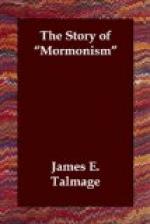A military organization, the “Nauvoo Legion,” was authorized, and the establishment of a university was provided for; both these organizations were successfully effected. It was here that a memorial was prepared and sent to the national government, reciting the outrages of Missouri, and asking reparation. Joseph Smith himself, the head of the delegation, had a personal interview with President Van Buren, in which the grievances of the Latter-day Saints were presented. Van Buren replied in words that will not be forgotten, “Your cause is just, but I can do nothing for you.”
The peaceful conditions at first characteristic of their Illinois settlement were not to continue. The element of political influence asserted itself and the “Mormons” bade fair to soon hold the balance of power in local affairs. The characteristic unity, so marked in connection with every phase of the people’s existence, promised too much; immigration into Hancock county was continuous, and the growing power of the Latter-day Saints was viewed with apprehension. With this as the true motive, many pretexts for annoyance were found; and arrests, trials, and acquittals were common experiences of the Church officers.
A charge, which promised to prove as devoid of foundation as had the excuses for the fifty arrests preceding it, led Joseph Smith, president of the Church, and Hyrum Smith, the patriarch, to again surrender themselves to the officers of the law. They were taken to Carthage, Joseph having declared to friends his belief that he was going to the slaughter. Governor Ford gave to the prisoners his personal guarantee for their safety; but mob violence was supreme, more mighty than the power of the state militia placed there to guard the prison; and these men were shot to death, even while under the governor’s plighted pledge of protection. Hyrum fell first; and Joseph, appearing at one of the windows in the second story, received the leaden missiles of the besieging mob, which was led by a recreant though professed minister of the gospel. But the brutish passion of the mob was not yet sated; propping the body against a well-curb in the jail-yard, the murderers poured a volley of bullets into the corpse, and fled. Thus was the unholy vow of the mob fulfilled, that as law could not touch the “Mormon” leaders, powder and ball should. John Taylor, who became years afterward president of the Church, was in the jail at the same time; he received four bullets, and was left supposedly dead.




